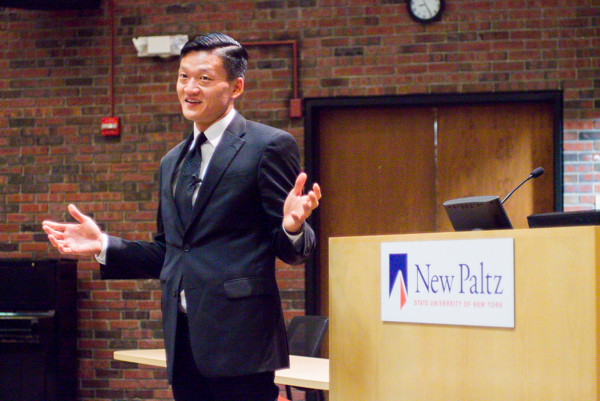
West Point graduate, Iraq War veteran and LGBT activist Lt. Dan Choi promoted a message of love and courage in his lecture to SUNY New Paltz students and staff on Oct. 6.
These two internal characteristics helped propel Choi from his position as a go-to Arabic negotiator in Baghdad and asset in the New York National Guard to the face of LGBT rights in the military. Choi, a gay man, was ‘honorably discharged’ after he came out.
He became a huge advocate of repealing “Don’t Ask, Don’t Tell,” the military’s policy on banning gay and lesbian service men and women openly declaring their sexuality which was repealed by Congress in 2010.
Choi was in Baghdad when speakers projectedwhat he thought would be the call to prayer, as he had heard so many times before, instructing the Muslim faithful to join together and worship. Instead what came over the megaphone was a Shiite political rally cry; a group who had been religiously oppressed for centuries and was encouraged to stay in hiding was claiming their identity outside of a Sunni mosque.
“‘Better that you live, better than you do God’s work on earth,’” Choi said the common belief was. “‘Don’t share your identity. Don’t be stupid,’ they would say. So it was surprising to the hear this identity speech. Hundreds of years of discrimination, in this time and those people were standing up for themselves. I looked up to that.”
Choi said this message continued to resonate with him as he would speak to war lords and tribal leaders and tell about a poem by a famous Iraqi poet Mutanabbi.
“The horses and the night and the desert, they know who I am, they know me,” Choi recited in the English translation. “The sword and the spear, the pen and the scroll, they know who I am, they know me… they shall know you.”
Choi said he would then explain to them that they were there to help establish a democracy established in the belief that no matter what your political or religious identity, you should be seen as who you are and have access to full rights in a federal government. But he said he was not advocating in his own life the message he was promoting. He was not standing up to the intolerance and inequality he was experiencing being a gay man in the military.
He found his voice to do so after he returned home in late 2007. He had learned how to fight in war, but the values of loyalty and sacrifice came to life like they had never before when Choi fell in love with his partner, Matthew. He said he became a better soldier, a better officer and had courage like never before, having the support system of someone he loved so deeply.
Choi said taking the first step and telling his conservative South Korean parents that he was in love with a man was like “going home to a different war, without the body armor.” In the midst of the passing of Prop 8, his mother pushed him to marry a nice Korean girl – a reality he let her know was not going to happen. His father, a southern Baptist minister, said that his homosexual relationship was the number one sin.
“Love your neighbor as yourself,” Choi said. “That’s the number one command. But to love others, you have to love yourself first… so if you want to know about hate, you must hate your neighbor as you hate yourself. Hate and violence comes from hating yourself first.”
This realization further exposed the faulty ethics in both his religious and military experiences. As a cadet at West Point, Choi reflected on the honor code, which demanded truth and integrity – a lack of truth could put your soldier’s life at risk because of your lack of courage to be transparent. The act of honor, in family and on the battle field, should not be restricted to straight people, Choi said. He honored his family, so he told them the truth about his sexuality. And he honored his sexuality and who he was, so as the face of Knights Out, comprised of LGBT West Point graduates, he came out to the nation on the “Rachel Maddow Show” in 2009.
“Honor means you love someone enough, you believe in their leadership enough, to tell them the truth, regardless of the outcome,” Choi said. “It’s about unconditional love. Unconditional means regardless of how you treat me, I’m going to tell you the truth, even if it hurts you. And I am going to tell you because I love you.”
Because of this, Choi urged everyone to tell their parents their sexual orientation, even if they may not accept it. Loving people who may not understand or accept you and having the courage to tell them is a key element in changing minds and demonstrating your equality, he said.
“In 50 years the world will learn its lesson,” he said. “We are going to win because ours is a value-based movement to increase love and understanding through courage.”
Choi said that the feared king who hired Mutanabbi to write that poem wanted his greatness and longevity captured through Mutanabbi’s word. But we don’t even recall his name, Choi said. It’s 700 years later, and all that is remembered is Mutanabbi, son of a servant women, no rank or stature to his name, with a skill for the written word.
“Whatever skill you have, wherever you come from, you are here and you have skills and you have that potential to be remembered, if you have the courage to put those skills into use,” he said. “You have just as much moral conviction, you have just as much moral virtue and knowledge, all of the instruments that you will ever need. And you are most moral right now … you know who you are.”
